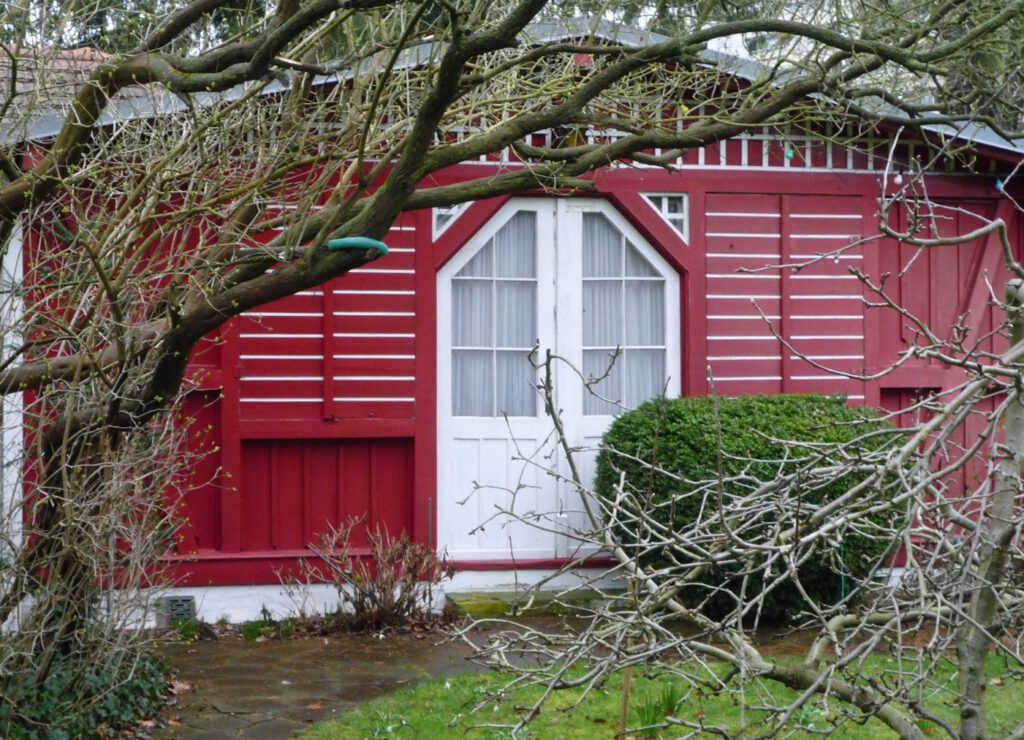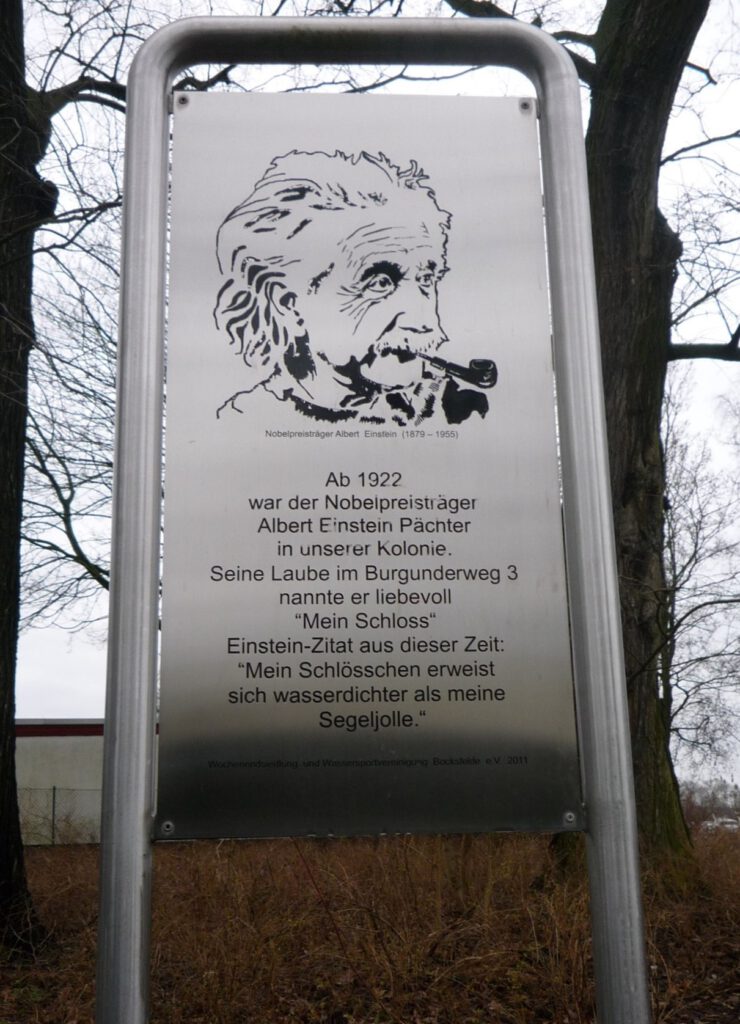“The boys are here and are lodging in my Spandau Castle. I am commuting back and forth between the city apartment and the castle which, contrary to my sailing boat, is proving to be watertight.”
Albert Einstein to Hermann Anschuetz-Kaempfe, July 25, 1922
Einstein’s “Spandau Castle”
Even today, it is still largely unknown that Albert Einstein had been a “Laubenpieper” for a short time. *)
Already in September 1920, Einstein had urged his wife Elsa to buy a summer house at a lake and a sailing boat. However, both wishes should only be fulfilled in 1929.
Back to the “Laubenpieper” Einstein.
At the beginning of the 20ies (1921), Einstein and his wife rented a plot of land consisting of a small property with a small house in the Spandau allot settlement Boxfelde, Burgunderweg 3. The allot settlement belongs to the district Pichelsdorf of Spandau. The settlement – which today is written “Bocksfelde” – lies at “Scharfe Lanke”, a picturesque bay at the river Havel. As the promenade with its landing stages and sailing clubs was not too far away, he could also satisfy his great passion for sailing. On August 28, 1921 Einstein wrote to his first wife Mileva Einstein-Maric: “I now have a guest cottage in Spandau by the water, in which I can always accommodate the boys during the warmer season without anyone among the family here coming along.“
He lovingly called his summer house his “Spandau Castle”.

Even today, the small house looks the same as back then
Einstein loved to retreat to his “Spandau Castle”, where nobody disturbed him.
During the summer months, Albert Einstein enjoyed the idyll of his summer house. In 1922, he spent his summer holidays there with the sons from his first marriage, Hans Albert and Eduard. While the boys stayed in his “Castle”, Einstein commuted between his city apartment and the “Castle”. Elsa probably was there more seldomly because she found it too small and too uncomfortable. But when she was there, then it was only for one or two days.
Contemporary witnesses reported that Einstein also had contact with other renters.
On March 4, 1922 Einstein wrote to his boys Hans Albert and Eduard: “I meanwhile bought a most lovable sailing boat with a sail in impeccable condition, so our time together at the so-called castle will be magnificent.“ However, this impeccable condition proved to be wrong. The boat had a leak and had to be repaired with a lot of effort. To Hermann Anschuetz-Kaempfe, Einstein wrote on July 16, 1922: “My Lisa (sailing boat) is still lying, completely drunk, on the shore and is waiting for the untrustworthy shipbuilder, who made fun of us today, on top of it all, to take pity on her.“
He often sailed with his boat on the river Havel. Thus, he also sailed to his Hungarian friend and physician Janos Plesch (1878-1957) who lived in Gatow in his country estate, Villa Lemm, where – according to contemporary witnesses – Einstein also played the violin. Also on March 14, 1929 Einstein “fled” to Villa Lemm to avoid the hype and the congratulators on his 50th birthday.
Because of all these “comfortable” activities, he recklessly neglected the small garden. He did not really enjoy working in the garden, so that the garden became overgrown. The grass, the flowers, the weed, and all the other growths spread uncontrollably. However, an allotment garden was not only made for relaxing and having a rest. According to the statutes of the allotment holders, the rented allotment had to be taken care of.
The consequence was a letter of the district administration Spandau, in which Einstein was told that they would rent the allotment to another person. In the letter dated September 12, 1922 it says: “[…] the weed has spread to the whole allotment, […] Parts of the fence have to be repaired, and the whole allotment does not make a good impression. We have to assume that you are no longer interested in renting this allotment, and therefore we will rent it to somebody else as of October 1, 1922, […] We kindly ask you to eliminate the current condition and to inform us accordingly.”
Subsequently, Einstein promised to improve the situation. On September 23, 1922 he wrote to the district administration: “[…] In the next spring, we will have the fence repaired and the garden arranged, […] However, I explicitly want to mention that we also in the future have the greatest interest in renting the allotment.”
It must be assumed that Einstein had the garden arranged in the spring of 1923.
On June 25, 1923 the district administration Spandau terminated the rental contract for Einstein’s allotment in Boxfelde, however, at the same time it offered him – to changed conditions (significant increase of the rent) – to prolong the contract by one year. If he was interested, Einstein should communicate this within the next 14 days. In the letter it says: “[…] Thus, we are terminating your rent contract to September 30, 1923. If you pay a rent of […] we are willing to prolong the contract by one further year, and kindly ask you to let us know within 14 days if you agree.“
It is assumed that Einstein directly dictated the answer to this letter to his secretary who then wrote the text on the envelope in shorthand.
On behalf of the author, Dr. Jascha-Alexander Koch from the Stenografenverein 1897 Langen E. V. has taken over the task to transcribe the shorthand. Accordingly, Einstein dictated to his secretary what follows (line for line transcription):
“I am willing[,] to sign a contract,
under the conditions (stated by you in your letter dated) …
I kindly ask you to excuse the belated answer
and to consider that I have just returned to B[erlin]
a few days ago.“
However, the letter to the district administration Spandau which contained Einstein’s answer cannot be found. Maybe it was not written or even not sent. The latter could be correct as in Einstein‘s written estate and in the relevant literature, after the letter dated June 25, 1923 nothing more can be found on Einstein’s “Spandau Castle”!
It is not known how often the “Laubenpieper” Einstein was in his “Castle”. It can’t have been that often, as during his time in Boxfelde and in addition to his work in Berlin he often made longer journeys (Japan, Spain, the Netherlands, Sweden, …).
It is also not known when and by whom the rent contract was terminated in the end, i.e. how long Einstein was a “Laubenpieper”! One probable date is September 30, 1923.
Since March 14, 2011 (Einstein’s 132nd birthday) a stainless steel memorial plaque in which is framed by a steel support can be found in the weekend property Bocksfelde. It reminds of Albert Einstein‘s time at “Scharfe Lanke”.

In addition to a portrait of Einstein, the memorial plaque has the caption: “Nobel prize laureate Albert Einstein (1879 – 1955)” with the following text:
„Since 1922
the Nobel prize laureate
Albert Einstein had been a renter
in our colony.
His summer house in Burgunderweg 3
was lovingly called
“My Castle”
Einstein citation from this time:
”My Castle proves to be more
watertight than my sailing boat.”
Wochenendsiedlung und Wassersportvereinigung Bocksfelde e.V. 2011”
*) “Laubenpieper is a (facetious) name for the owner of an allotment (with a summer house), whereas the used property is – in the figurative sense – often called “Laube”.” Source: Wikipedia
02/24
Illustrations Credits:
Christine Hüttner, Potsdam: 1, 2
Bibliography:
| Hrsg. Diana Kormos Buchwald, Ze’ev Rosenkranz, Tilman Sauer, u. a. | The Collected Papers of Albert Einstein, Volume 12 | Princeton 2009 |
| Hrsg. Diana Kormos Buchwald, József Illy, Ze’ev Rosenkranz, u. a. | The Collected Papers of Albert Einstein, Volume 13 | Princeton 2012 |
| Hrsg. Diana Kormos Buchwald, József Illy, Ze’ev Rosenkranz, u. a. | The Collected Papers of Albert Einstein, Volume 14 | Princeton 2015 |
| Albrecht Fölsing | Albert Einstein – Eine Biographie | Frankfurt/Main 1993 |
| Hubert Goenner | Einstein in Berlin | Munich 2005 |
| Dieter Hoffmann | Einsteins Berlin | Berlin 2018 |
| WWVB e.V. | Bocksfelder Geschichte(n), (1919-1997) | Berlin |


 DEUTSCH
DEUTSCH